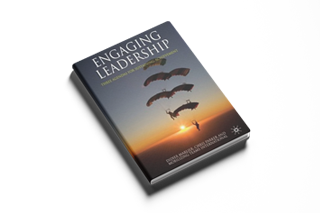 Pixabay picture. With gratitude
Pixabay picture. With gratitude
“This is going to be a very long journey!” I remember thinking, when the conversation started with the taxi-driver, taking me from São-Paulo international airport, to the luxury resort of Guaruja, where I was invited to speak in a large C-levels conference. It felt like the ride, normally lasting 2.30 hours, would never end…
The driver was a warm supporter of a local far-right extremist politician, determined to convince me that the man he supported was far better than the other side, which was a sort of Evil to him… I thought that the discussion (if that name could be applied to his long, provocative monologue) could end up badly. Determined to make the best of our time together in the cab, I offered the man, that we both should refrain from seeking to convince each other nor denigrate the other side, but that we should seek to understand why the other person was thinking the way they did, which fears, hopes, ideals, values were hiding behind their position and all this through open, respectful and curiosity-driven questions.
I still fear that the poor man had no choice, as I was the client but as he, reluctantly, accepted the challenge, we ended-up having a fascinating conversation and… are still part of each other WhatsApp network and I use his services when going to São-Paulo.
The story goes that when the late Henry Kissinger, Secretary of State under Presidents Nixon and Ford, attempted to hold the very first secret mediation between Egypt and Israel, the meeting started in the worse possible manner: the Egyptians putting as a prerequisite to any form of conversation, an unconditional non-negotiable return under their sovereignty of the Sinai Peninsula (lost to the Israelis during the “6 days war”). The meeting immediately started to go pear-shaped, in a position battle. Henry Kissinger, after uniting the rivals under the banner of humour (attempting to de-dramatise the situation), encouraged them to understand the legitimate principles of each side, hidden behind their intransigent position. When the Israelis understood that restoring National Pride was what mattered to their Egyptians counterparts and National Security was what motivated the Israelis’ position (for the Egyptians) a solution (apparently still valid today) became easier to find: The Sinai would return under Egyptian flag but as a highly controlled, demilitarised zone to safeguard Israel.
What Secretary of State Kissinger did on that day, has become a critical skill for political, community and business leaders. In fact, will anyone claim that the US are better-off internally and on the international stage after the nightmarish scenario of polarisation triggered by its previous President? Has the United Kingdom seen all the advantages that were expected of its extreme Brexit position? Is the World Economy in a better shape now that we have been unable to prevent a Barbarian conflict between Russia and Ukraine? How confident are we that the World will be a better place to live in, should China and the US go into an open confrontation, such as NATO and Russia?
We are frequently invited to help executives’ teams to hold difficult conversations. It is one of my favourite mission, when seeing intelligent people using their brains as tools instead of weapons as ex-IMD faculty, Chris Parker used to say.
When observing several of the theories and studies about how to avoid polarisation and engage into a successful conversation, three practices strongly emerge:
- Focus on understanding: It is not about negotiating, agreeing, nor disagreeing. It is about putting our intelligence, our reflective abilities, our life experience at the service of creating comprehension, ensuring the other person’s thinking isn’t “foreign” to me.
- Ensure non-aggression: I recently came across an article from French special intervention forces (G.I.G.N.), seasoned negotiator and behavioural psychologist, Bernard Thellier. He was explaining the focus on the right type of communication he kept, during his dialogue with hostage takers and other “terrorists”: “On a hostage situation, the words that came out of my mouth could “hurt” and even “kill”. I paid particular attention to “taking care” of the quality of my communication. I call it “benevolence” even in front of an aggressive person. Anger, rigidity, the imposition of one’s vision, only increases the opposition of the “other”. The quality of my communication has now become a habit. I never let my emotions get the better of me. I never hurt the person in front of me even if they do. I draw an incredible conclusion, which is that you get more from kindness than from anger or malice. Take care of your communication and you will take care of others. But for this it is important to take care of yourself first.” (here the link to the original post).
- Reach a mutually satisfactory conclusion: History shows us that, should there be real or perceived “winners” and “losers” by the end of a conflict, the war will never end. Suffice to see what happens at the very moment in various regions of the World, endangering the whole planet. I mentioned it once, but as a child, I had been very shocked by the episode of the “Caudine Forks” (already explained once on this blog) in 321 AD. A tribe, refusing submission to the Roman Empire, managed to capture a whole legion. Rapidly after the military feat, the Samnites (the rebellious tribe) refused to exterminate the soldiers, deeming it too cruel and chose, instead, to humiliate Rome, by sending the legion and its leaders, naked and disarmed back home, in sign of provocation and humiliation. Far from reaching a truce, this clear stand about Losers and Winners, implied a far longer series of battles, skirmishes and violence. There should never be a defeated party, but just proud negotiators! A impacting moment about the movie “Invictus” relates the attitude of Nelson Mandela (M. Freeman) for his first speech, taking office. It is a moving example of no Winners nor Losers!
In the troubled times we live, I consider it my/our leadership duty to move away from polarisation, building bridges rather than walls and constructively progress through our differences and divergences. Enjoy your Leadership Journey!


I couldn’t agree more. Something that works for me in more daily situations is to recognize that we agree on 70%, have partial agreement on another 20% and completely disagree on 10% of whatever is going on.
So all involved have a choice to make: focus on the 10% and invalidate everything else OR start working together on the 70% we agree that can be improved. From there, we move to the other 20% once trust is built and we leave the 10% to re-examine as most likely we missed something.
Thank you, once again, dear Ingrid, for taking the time to read and wisely comment. I like what you suggest: It is up to us to choose what we want to focus on: 10% misalignment or the 70% agreement… Have a good week
Didier
Imagine …
Just imagine …
We start every conversation
Every interaction
Aware that the other
Our conversation’s partner
Knows something
We don’t …
Imagine …
Just imagine …
We start every conversation
Every interaction
Aware that we together
Truthfully
Can build bridges
And
Create comprehension.
Magnificent, dear Michiel, especially coming from someone who held in his hands the destinies of one of Brazil’s best banks
Mensagem muito importante e oportuna, meu caro Didier. Nunca estivemos tão distantes da escuta ativa e das mentes e corações abertos para a realidade do outro lado. Seus exemplos mostram com clareza a via alternativa para que as discussões não tenham como única saída perdedores e vencedores. Muito obrigado.
Obrigado, carissimo Francisco. Sua sabedoria illumina o nosso website. Obrigado!